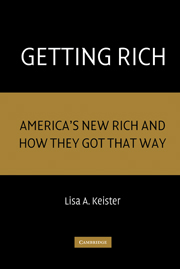4 - Getting Rich
Published online by Cambridge University Press: 05 June 2012
Summary
There is little doubt that the process by which people get rich is complex. It begins in childhood with interactions, experiences, and events that do not all appear to be related to adult wealth ownership. It then extends through adolescence and early adulthood. Over the life course, multiple interacting processes and events shape the trajectory that an individual follows. Individual choice is important, and of course, choice occurs within important constraints that make choice more or less free.
Understanding who gets rich is closely related to efforts to understand who is upper class in the United States. This intensely debated issue has attracted attention for decades. Class, or Marxist, theorists argue that the United States is ruled by a small, fairly stable upper class that is largely defined by wealth and the power that accompanies wealth ownership (Domhoff 1983). According to this camp, a cohesive upper class dominates government, controls powerful positions in business, and shapes the social and cultural climate in the United States. A more modest version of this perspective holds that the capitalist class does not control political organizations and that there is autonomy among politics, business, and social spheres. However, this moderated class approach retains elements of the Marxist perspective. They suggest, for example, that the pervasive ideology among both the upper class and everyone else is an ideology that originates from the upper class and serves upper-class interests (Lerner, Nagai, and Rothman 1996).
- Type
- Chapter
- Information
- Getting RichAmerica's New Rich and How They Got That Way, pp. 79 - 108Publisher: Cambridge University PressPrint publication year: 2005

